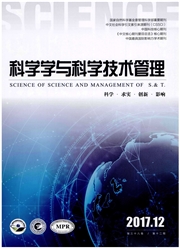

 中文摘要:
中文摘要:
提升专利质量已经成为中国科技发展迫切需要解决的现实问题。基于专利化过程提出"三阶段—两维度"专利质量测量指标体系模型,即从技术发明、申请审查和授权保护3个阶段,技术质量和经济质量2个维度构建专利质量测度指标体系,以中国C9联盟高校为例进行实证研究。结果显示:C9联盟高校专利普遍具有低被引、低转化率、维持时间短等特点,与全社会专利平均水平相比,高校专利在技术质量方面具有显著优势;C9联盟高校专利质量在不同的阶段呈现出不同的分布态势,其中清华大学专利在3个阶段的经济质量和技术质量均比较突出;与世界大学学术排名(ARWU)中学术水平相比,C9联盟高校学术水平与专利质量存在显著分化,两者之间相关性较弱。
 英文摘要:
英文摘要:
Regarding the enhancement of the quality of patents, it has been a realistic problem of the technology development of Chinese universities which needs to be addressed urgently. This study put forward a patent quality measurement index system model of 'three stages-two dimensions' based on the patenting process, which includes three stages of technological invention, applying for review and authorization protection, and two dimensions of technical quality and economy quality. Furthermore, the case of universities in Chinese C9 League is analyzed as an empirical research. The main results may be summarized as follows: Patents have the characteristics of low cited, low conversion rate and low maintenance time in C9 league generally. Comparing with patents of whole society, university patents have significant advantage in technical quality. Furthermore, C9 league shows different distribution results in different stages, the economic quality and technical quality of Tsinghua university patents are all outstanding in three stages relatively. Combining patent quality with the academic level of Academic Ranking of World Universities(ARWU), it shows a significant differentiation, which means a weak correlation between them.
 同期刊论文项目
同期刊论文项目
 同项目期刊论文
同项目期刊论文
 期刊信息
期刊信息
